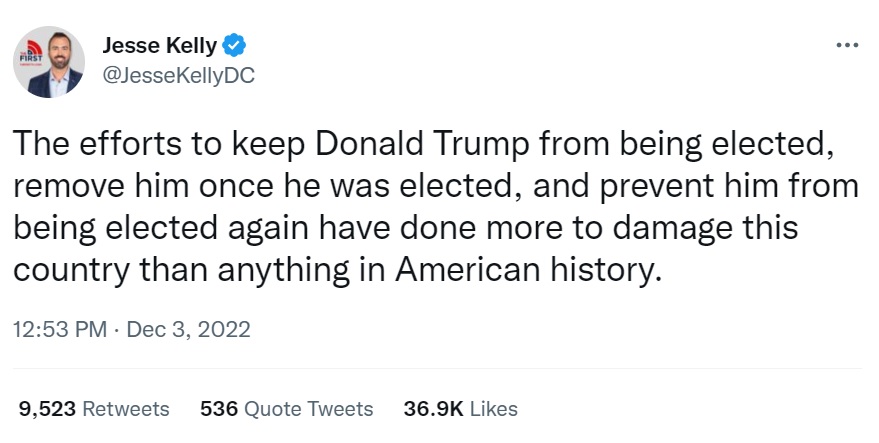Trump Isn’t The Nation’s Greatest Threat To Democracy. His Exile Is
Former President Donald Trump is back as a candidate, but after leaving the White House, he never left the political arena — and therefore, the investigations designed to send him into political exile never let up either.
Trump’s bid for a nonconsecutive second term is faced with the same level of resistance that hampered his first, when Beltway actors weaponized the levers of government to politically terminate their public enemy number one, beginning from before day one.
In February last year, Trump became the first and only president to undergo an impeachment trial in the Senate after he had already left office. One week before Joe Biden took the presidential oath, Trump was hit with a snap impeachment from House Democrats who sought to indict the outgoing president for the Capitol riot on Jan. 6, 2021.
It didn’t matter that the president had encouraged demonstrators to protest “peacefully” that day. It didn’t matter that the riot erupted before Trump had even finished speaking more than a mile down Pennsylvania Avenue. What mattered was that Trump supporters flooded the Capitol, interrupted a joint session of Congress, and gave House Speaker Nancy Pelosi an opportunity to invent a new hoax in pursuit of the top item on the Democrats’ policy agenda: the criminal conviction of President Donald Trump, and with it, a lifetime ban on running for office.
On Saturday, conservative radio host Jesse Kelly wrote on Twitter, “the efforts to keep Donald Trump from being elected, remove him once he was elected, and prevent him from being elected again have done more to damage this country than anything in American history.”

Kelly’s statement might be hyperbolic, but it’s also far from inaccurate. From the Russia collusion hoax to impeachment, Democrats have normalized the radical weaponization of government institutions to thwart their opponents no matter the cost, setting the precedent for decades of political warfare to come with dangerous potential to escalate.
President Biden branded his own election and this year’s midterms as a contest over the “soul of the nation.” On Sept. 1, Biden launched the fall campaign season with a speech that looked like it was delivered out of a scene from Hell, in which he claimed Trump and the former president’s supporters “represent an extremism that threatens the very foundations of our republic.”

Contrary to these hyperventilated claims that are now routine among Democrats and the Beltway press, however, it’s the establishment’s reaction that threatens to undermine American democracy, with witch hunt after witch hunt designed to burn the orange-haired witch.
According to the Pew Research Center, trust in government remains depressed at a “near historic” low. Polling from Gallup shows fewer than 1 in 10 Americans hold “a great deal” of trust and confidence in the media, while roughly 1 in 5 approves of Congress. In August, days after the FBI conducted an unprecedented raid on the residence of a former president and future candidate, a survey from the Trafalgar Group found that 4 in 5 Americans see a two-tiered Justice system. The harder Democrats go after the former president, with habitual censorship, politicized investigations, and deep-state operations, the harder it will be for Americans to regain trust in representative institutions and faith in democracy itself. Instead of working with the Republican president after 2016, Democrats spent four years undermining voters with efforts to throw the democratically elected president out of office altogether.
When Trump is demonized as some kind of modern-day Adolf Hitler, an episode which was repeated just last week after he hosted a group of dinner guests that included individuals who admire the former Nazi dictator, it makes it easier for Trump’s opponents to justify extreme means to meet their ends, no matter the cost for actual democracy. It’s also why, when Trump makes claims of widespread voter fraud without presenting any evidence, his supporters will believe him anyway — because if ballot workers become convinced a candidate is literally Hitler, might they not manipulate the vote? The Democrats’ DOJ has already proven its willingness to go after Trump with every resource at its disposal, even dispatching a second special counsel probe against the former president five years after it launched the first. After losing trust in every institution along the Acela Corridor, Trump has become the only person his supporters feel they can trust.
Days before the midterms, just slightly more than 6 in 10 Americans told Gallup they were “very” or “somewhat” confident their votes would be counted accurately, with Democrats more than twice as likely to express that confidence compared to Republicans. When the rules are rigged by Silicon Valley censorship and Election Day ballot games, there’s good reason to be skeptical. Was there enough voter fraud to turn contests in either this year or 2022? Probably not. But are there enough reasons to be concerned about election integrity moving forward, based on online censorship and last-minute rule changes? Absolutely.
Divisive efforts to force Trump’s exile spell out profound implications for how American politics are conducted moving forward — while undermining faith in democratic institutions along the way, right down to the integrity of the ballot box. If Americans don’t vote because they don’t trust that their votes will count, then America doesn’t have a democracy to begin with. If Americans can’t engage in the marketplace of ideas in the digital public square, then America doesn’t have a democracy to begin with. If Americans are barred from even voting for their chosen candidate, then America doesn’t have a democracy to begin with.





Post a Comment